|
|
|
Sort Order |
|
|
|
Items / Page
|
|
|
|
|
|
|
| Srl | Item |
| 1 |
ID:
095530
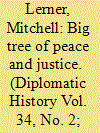

|
|
|
|
|
| Publication |
2010.
|
| Summary/Abstract |
During his three years as John F. Kennedy's vice president, Lyndon Johnson made eleven trips to thirty-three countries, covering over 120,000 miles, more than any of his predecessors. Yet, few contemporaries, including the journalist who described Johnson as someone "who chases around continents in search of the duties of his office," considered these trips significant.1 Some even suspected that he was sent away so often simply because JFK wanted to keep the overbearing Texan occupied and hence away from him; Kennedy, one West Virginia newspaper wrote, had recently sent him overseas twice in order "to keep his Vice President busy."2 Most policymakers also saw these missions as unimportant. Deputy Undersecretary of State William Crockett, who sometimes accompanied Johnson, recalled that "on the trips he took as Vice-President, there wasn't much policy to discuss; they were essentially representational functions."3 Such sentiments were both common and unsurprising, as Americans everywhere recognized that Johnson played virtually no role in the major policy decisions of the administration. In 1963, Time Magazine noted that the former Senate leader was now "lost in the vice-presidency," and a Newsweek article entitled "LBJ: Who's That?" described its subject as "as powerless as a freshman Senator and almost as obscure."4 A year earlier, Newsweek had noted of the former leader that "Lyndon Johnson is in the position of an abdicated king, and kings who abdicate are monarchs without power."5 His nonexistence seemed confirmed by the television show Candid Camera, which asked random people, "Who is Lyndon Johnson?" Answers flew: a baseball player, an astronaut, but no one (at least, no one who was televised) identified him as the vice president of theUnited States. "No, I don't know him," explained one man. "I'm from New Jersey.
|
|
|
|
|
|
|
|
|
|
|
|
|
|
|
|
| 2 |
ID:
095528
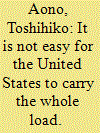

|
|
|
|
|
| Publication |
2010.
|
| Summary/Abstract |
This article reexamines Anglo-American relations in light of the Berlin crisis during the Kennedy years. The Berlin crisis has been extensively studied, especially after the 1990s when newly declassified materials shed new light on the incident. Using archival sources of the former Soviet bloc countries, recent works have closely explored Khrushchev's motivation for provoking such a conflict in Central Europe, while revealing the dynamics of alliance politics between the Soviet Union and the German Democratic Republic (GDR).1 On the Western side, while focusing mainly on American and West German decision making, many studies point out that the major Western powers-the United States, Britain, France, and the Federal Republic of Germany (FRG)-disagreed on how to handle the Berlin crisis.
|
|
|
|
|
|
|
|
|
|
|
|
|
|
|
|
| 3 |
ID:
095526
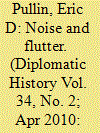

|
|
|
|
|
| Publication |
2010.
|
| Summary/Abstract |
After the Japanese attack at Pearl Harbor, the administration of Franklin D. Roosevelt recognized that India possessed impressive military and industrial capacities, but he concluded that its anticolonial struggle for independence from the British Empire placed those capacities in doubt.1 At the same time, the administration observed an increasing connection between diplomatic goals and information activities.2 Although appreciating the importance of propaganda in international affairs, the administration failed to articulate the role and purpose of American information activities. The failure stemmed in large part from the Roosevelt administration's ambivalence about its policies concerning the British Empire and Indian nationalism. The Office of War Information (OWI), the organization responsible for U.S. propaganda abroad, received precious little direction from Washington concerning strategy or operations in India. Initially left on its own in India, the OWI attempted to generate goodwill by presenting the United States as the world's defender of democracy. Instead, American propaganda fostered suspicion among the British and Indians about U.S. motives. The OWI even confounded American diplomats, such as William Phillips, the second personal representative appointed by President Roosevelt in India, who warned that, "The Indians too may well be wondering whether we Americans are really going to displace the British by turning the attention of Indians to American methods, production and ideals.
|
|
|
|
|
|
|
|
|
|
|
|
|
|
|
|
| 4 |
ID:
095527
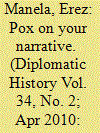

|
|
|
|
|
| Publication |
2010.
|
| Summary/Abstract |
When Dr. Viktor M. Zhdanov, Deputy Minister of Health of the Soviet Union, arrived in Minneapolis, Minnesota, in May 1958 to attend the annual meeting of the World Health Assembly (WHA), the governing body of the World Health Organization (WHO), the visit was not routine.1 Reflecting Soviet premier Nikita Khrushchev's new policy of "peaceful coexistence" with the West, it marked the first time that a Soviet delegation had been sent to that forum since the establishment of the WHO ten years earlier.2 And Zhdanov made his mark, calling on the organization to launch a global campaign to eradicate smallpox, one of humankind's oldest and deadliest diseases. Mindful of the meeting's venue, he began his call with a quote from a letter that U.S. president Thomas Jefferson had written to Edward Jenner, discoverer of the smallpox vaccine, more than a century and a half earlier. The discovery, Jefferson had written the English physician in 1806, would ensure that "future nations will know by history only that the loathsome small-pox has existed.
|
|
|
|
|
|
|
|
|
|
|
|
|
|
|
|
| 5 |
ID:
095525
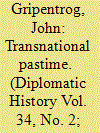

|
|
|
|
|
| Publication |
2010.
|
| Summary/Abstract |
On September 18, 1931, Japanese troops bombed a section of the Japanese-operated South Manchurian Railway outside the city of Mukden, blamed it on Chinese troops, and then used the manufactured incident as a pretext to conquer all of Manchuria.1 Within a year Japan formalized its territorial aggrandizement by "recognizing" the puppet state of Manchukuo. The Japanese advance in Manchuria was an epochal moment in world history, widely regarded as the first salvo of World War II. Historian David Kennedy asserts, for example, "On the wind-scoured plains of Manchuria, Japan . . . set the match . . . to the long fuse that would detonate the attack on Pearl Harbor just ten years later." Japanese scholar Saburo Ienaga similarly states, "The Pacific War began with the invasion of China in 1931," adding that events at the time "are inseparable, all part of the same war." Walter LaFeber meanwhile writes in his survey of U.S.-Japan relations that "World War II's roots ran back to September 1931, when the Kwantung Army struck to place all Manchuria under Japanese control."2 In logical accordance with this interpretation, some historians claim U.S.-Japan relations soured irreconcilably in the aftermath of Japanese aggression. "From this time on," writes Paul Schroeder, "the United States was to grow steadily more suspicious and hostile, until she finally stood militantly opposed to Japan's aggressive expansion." Another scholar adds that Japan's popularity among the American public "declined rapidly" following events in Manchuria.
|
|
|
|
|
|
|
|
|
|
|
|
|
|
|
|
| 6 |
ID:
095533
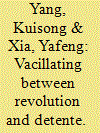

|
|
|
|
|
| Publication |
2010.
|
| Summary/Abstract |
After nearly twenty-two years of confrontation and hostility between the United States and the People's Republic of China (PRC), U.S. president Richard Nixon made his historic trip to China and met with Chinese supreme leader Mao Zedong in February 1972. Nixon's one week in China represented a profound turning point in U.S.-China relations. The historic Nixon-Mao handshake stood as a great diplomatic victory for Beijing as well. The Chinese leaders could now focus their attention on the Soviet threat and avoid fighting a possible two-front war. A Chinese Communist party (CCP) Central Committee (CC) document hailed the summit for its success in "utilizing [others'] contradictions, dividing up enemies, and enhancing ourselves," and credited this to Mao's "brilliant decision" to invite the U.S. president.1 Nixon and Mao have often been given credit for achieving U.S.-China rapprochement in the early 1970s. Was Mao really a realistic leader as many have suggested?
|
|
|
|
|
|
|
|
|
|
|
|
|
|
|
|
|
|
|
|
|